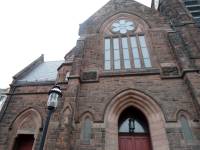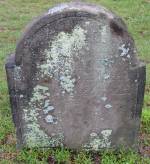

 Preserved Clapp was born to Roger Clapp and Joanna Ford on 23 November 1643 in Dorchester, Massachusetts. He lived in Dorchester until he was in his early 20's when he moved to Northampton, Massachusetts. In Northampton, Preserved became a respected Church Elder and was a Captain of Northampton. He was a representative of Northampton in court. On 4 June 1668 he married Sarah Newberry in Northampton, Massachusetts.
Preserved Clapp was born to Roger Clapp and Joanna Ford on 23 November 1643 in Dorchester, Massachusetts. He lived in Dorchester until he was in his early 20's when he moved to Northampton, Massachusetts. In Northampton, Preserved became a respected Church Elder and was a Captain of Northampton. He was a representative of Northampton in court. On 4 June 1668 he married Sarah Newberry in Northampton, Massachusetts.
The wife of Preserved, Sarah Newberry was the daughter of Captain Benjamin Newberry and Mary Allyn. She was born on 14 June 1650 in Windsor, Connecticut. She is buried at The Bridge Street Cemetery in Northampton.
Preserved Clapp and Sarah Newberry had eight children who I have listed below. All the children were born in Northampton, Massachusetts.
The records of Northampton show that the children of Preserved and Sarah were educated by private lessons paid for by their father. Even the daughters received lessons and were taught to read and write.
Northampton played a huge part in King Phillip's War. During this conflict, on the 28th of October 1673, the home and barn of the Clapp family was burned to the ground by the Indians. Everything the family owned was destroyed by the fire, including their crops. The Clapp family had to rely on the charity of their neighbors to survive after the fire. Three of the neighbors of the Clapp family met a similar fate the same day. The following day another Indian raid occurred, this time they killed 3 persons. By the following winter the town had taken steps to fortify itself to protect the citizens from attacks. On January 1, 1676 Preserved Clapp petitioned the town for land within the safer boundaries of the fortification to build a house and barn on. He was granted the land by the town.
In 1689 Preserved Clapp was made Captain of the militia. He obtained this commision by vote of the selectmen. The records of Northampton reveal the Preserved Clapp was on lists and serving the militia in the following conflicts:
Preserved was also sent to Deerfield to assist them conflicts with hostile bands of Indians. In Deerfield, there were conflicts almost every day. Captain Clapp and a band of 20 men from his company were ordered to assist in Deerfield. Captain Clapp served there a week to 10 days assisting in protecting the town and searching for "hostile" Indians.
In 1702, after the war ended, a seating committee of 3 men was chosen by vote. Preserved Clapp (Elder Clapp), Mr. Hawley and Elder Strong were elected onto the committee. This committee was empowered to seat persons in the meeting house and represent the town when called upon to do so. Some of the men who had defended Northampton during the French-Indian war claimed exemption from poll taxes and because of this, the county court intervened to protect them. In June 1708 Preserved Clapp petitioned the general court on their behalf concerning this matter. He explained to the court that they had difficulties regarding the taxing polls of young men that "improved in her majestie's service: we have taxed them knowing no law to the contrary, but our Justices have freed them from the poll money." He asked for an explanation so that the assessors would know their duty. The Court responded that no one was exempt from country tax except those exempted by law. Regarding the poll tax, only the assessors were the judge regarding exemption, not the Courts.
 Elder Preserved Clapp died in Northampton on 20 September 1720. He is buried in The Bridge Street Cemetery in Northampton where his grave can still be viewed. A larger picture of this grave is here. Sarah Newberry Clapp's grave can be seen here. You can view more pictures of Northampton and graves from the Bridge Street Cemetery here.
Elder Preserved Clapp died in Northampton on 20 September 1720. He is buried in The Bridge Street Cemetery in Northampton where his grave can still be viewed. A larger picture of this grave is here. Sarah Newberry Clapp's grave can be seen here. You can view more pictures of Northampton and graves from the Bridge Street Cemetery here.
Back to Clapp Index
Home | Locations | Surname Index | Photo Galleries |